#epic: the musical analysis
Text
Why "Full Speed Ahead" is the Best Expositional Song
as some of you may have noticed, i am very in love with Epic: the Musical, and i need y'all to know just how great it is. for one, it's the Odyssey in musical form (2 of my favorite things). for another, the lyrics, the musicality, the choices the writer/composer Jorge rivera-Herrans makes are so clever and witty and ingenious and UGH! so good *chef's kiss*
so i could go on for hours (probably days) explaining why each song is beautifully made.
"The Horse & the Infant" is a wonderful opener, sets up the background context since this story's a sequel to the Iliad (basically, a "previously on Homer's epics").
"Just a Man" JFC WHAT A SONG! IT IS SO GOOD! SO HAUNTING T^T a wonderful set up for Odysseus' character and his arc in the story.
"Warrior of the Mind" sets up the relationship between Odysseus and Athena and what their conflict will be.
but i am not here to go on for days about the musical. i am here to go on for (constrained) hours about one song and why, in my opinion, it is one of the best expositional songs i've ever heard.
OK SO BASICALLY
Trojan War is over. They've won. They can go home! the music itself sounds triumphant and ready for adventure. Odysseus even says how marvelous it is that even when the war was cruel, he never lost a single man.
BUT, then we get the whole point of why their on the ship. "Make it back alive to [their] homeland," and it is sung in a more serious tone. the music also shifts and cuts off to really let you know how important this is. Immediately, you know 2 things: Odysseus never lost a man, their great challenge now is to get to Ithaca.
AND THEN, Odysseus sings how the "problem's not the distance," as in the issue won't be sailing, but really what they might meet on the way. And it is sung by the men who interrupt Odysseus (foreshadowing mayhaps :omg: ) to let the audience know that the real obstacle is "what lies inbetween" Troy and Ithaca.
AND THAT'S JUST THE FIRST PART!!!! Already, the audience are given 3 facts: Odysseus and his men cannot wait to go home, Odysseus was successful in not losing a soldier in Troy, trouble lies ahead. Due to well placed tone shifts and musical chords that go from triumphant to foreboding, we get clued in that there's a strong possibility not everyone will make back alive.
Now on to the characters (yeah, we ain't done :3 we are far from done). See, this song does not just set up what kind of story we will be getting, it also introduces you to the characters that will be sailing with Odysseus on this journey. However, these characters are so much more than companions to our dear friend Ody, but we'll touch on that later.
EURYLOCHUS: how he's introduced is just *chefskiss* because he repeats Odysseus's melody, but his lyrics talk about the new issues they are facing (no food). There is loyalty and deference as he speaks to Odysseus (and you feel that because he sings Odysseus's melody), but already, we see those cracks for him to doubt and question his captain. He's unsure where they'd find the food, he's worried about the size of their men since it's a lot of people to look after. And though Odysseus answers him by essentially telling him to observe where the "birds fly" off to, Eurylochus will continue to be doubtful about everything (their food supply, who to trust, etc.)
POLITES: [Baby boy] is introduced with a fucking key change into a major key. How his lyrics are sung so hopeful (note that he's the one to shift the tone and melody of the song, demonstrating just how important he is to Odysseus/the story), and how he's the one to find the island. He's the one who assumes that people might reside there and they could talk to them. Already, we learn how optimistic he is as well as Odysseus's relationship with him is more casual than it was to Eurylochus since he answers back to Polites with his name in the fondest melody ever T^T
AND FINALLY, why are these characters more than just companions to Odysseus? It is because they're a literal personification of Odysseus's internal war with mercy and ruthlessness. The OG heart vs. mind!
I will explain.
Eurylochus is Odysseus's remnant of the Trojan War since what they would do while at Troy to get food and survive was raid villages, be brutal, fight fire with fire. The mindset of the war has not left him, nor has it left Odysseus because Eurylochus is that part of Odysseus that has not shook off the old habit of ruthlessness. It does not help that the last act Odysseus made in Troy was kill Hector's infant child soooooooo....
Polites is the more merciful side of Odysseus. The side that wishes to approach things (with Open Arms) more diplomatically and peacefully rather than with force. We even see this side pop out during "The Horse and the Infant" when he is trying to find other options that would spare Astyanax from the fate the gods are pushing on both him and the child.
By the end of the Trojan War, Odysseus is tired of it. This war was 10 years long. He wishes to go home to his tiny island and kingdom and reunite with his family. He is done with war. However, despite leaving troy and desiring to escape the horrors he's seen, Odysseus will find himself not only in conflict with the monsters that lie between him and Ithaca, but the conflict of his wartorn-self and his merciful one.
-
and that, my friends, is why i love this song so much. everything about it is just so carefully chosen in the best way, and i love it.
go listen to Epic: the Musical
#epic: the musical#epic: the troy saga#the odyssey#odysseus#analysis#epic: the musical meta#epic: the musical analysis#full speed ahead#full speed ahead analysis#i wish i knew music theory just so i could delve deeper into the musicality of this song but alas T^T#long post#epic the musical#epic the troy saga
37 notes
·
View notes
Text
About the lines in "No Longer You" that go
Tiresias: I see your wife with a man... with a trail of bodies.
Odysseus: WHO!?
*half-beat*
The wording here and the half-beat are VERY INTENTIONAL, I think. The half-beat gives you JUST enough time for your brain to auto-fill an answer, and the word "who" rhymes with "you" (plus the fact that the word "you" has already been lingered on once or twice by this point in the song). All this comes together so that, when you hear this line, you instinctively want to shout back "You!" because you KNOW the answer and it's SO OBVIOUS, but Odysseus can't see it!
10/10 amazing artistry
(Also, most of us have seen this before. I won't explain it, but...)

221 notes
·
View notes
Text
I’m like, personally offended that achilles wasnt in the underworld saga at all. the conversation he has with odysseus is really fun.
this segment from the odyssey is really cool, this is the first thing Achilles says to Odysseus in the underworld. He characterizes Odysseus by his wits, and simultaneously refers to him as “Incorrigible”.
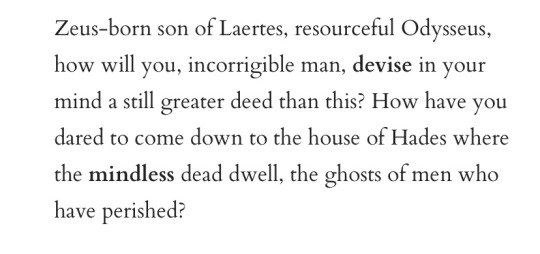
from here
Achilles and Odysseus are parallels. Achilles knew from the beginning he was never going to return home, and Odysseus’s journey home is literally Fucking Cursed to be deadly and dangerous. They are the mortal parallels to Ares and Athena, Wrath and Strategy. They are one in the same, and all too different.
here is another screenshot from that website describing odysseus and achilles’ conversation.
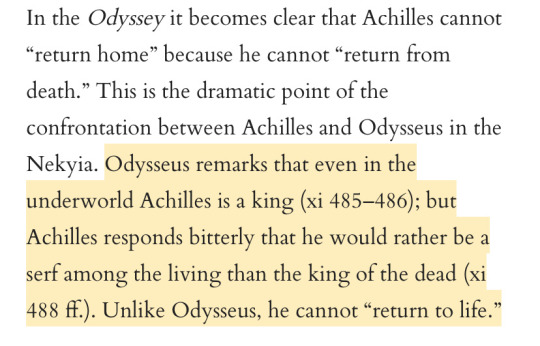
Yeah i just really like them.
#analysis#epic: the musical#epic the underworld saga#epic the musical#i guess#Achilles#the Illiad#Odysseus#the Odyssey#might write an Illiad musical… tempting. probably wont#Writing#long post
97 notes
·
View notes
Text

I had to make this to express to my musical theatre bestie the absolute soul crushing banger that is Epic: The Musical
#epic the musical#the odyssey#musicaltheatre#musical analysis#theatre kid#still screaming#about#the underworld saga#I ran here as fast as I could
57 notes
·
View notes
Text
many thoughts about epic: the musical...
i am once again in the middle of essay writing but plautus is boring and my friend introduced me to this album so u already know I binged the entire thing
(quick warning for spoilers of homer's odyssey? if that's necessary?? man idk whatever)
first thoughts naturally concerned odysseus. i have hated this man with a burning passion ever since I started studying classics - i think he is irredeemably selfish, a liar masquerading as a 'resourceful hero,' and basically just a twat all around. that being said, i respect that epic is not an exact replica. in fact, i like that about it!
readings of odysseus as a loving husband and father, and a man who cares deeply for his crew and fellow warriors is one i would love to see reflected in the source text (though i admit i have only read two different translations so far, so this is subject to change depending on translators choice!), if only because it would be so so refreshing. and epic does that extremely well! i find epic's odysseus to be far more likeable, insofar as he is fueled not by greed for glory (kleos for the nerds out there) but rather the desire to return to his wife and son. (I personally would argue that, while homer's odysseus is indeed fueled by a desire for homecoming (nostos), it is not for the sake of penelope and telemachus, but rather concern over the security of his status and position within the household (oikos))
i also very much enjoy that the love he holds for his family is not an inherently positive trait. in the aeneid, and often in myth, it is achilles' son, neoptolemus/pyrrhus who kills the son of hector and andromache, astyanax by throwing him from the walls of troy - less common, it is odysseus (which i did not know until i googled it just now oops). homer's odysseus does not reject the gods. he is beloved by some, hated by others - he receives their boons and curses as they come. he revels in the attention of the divine, no matter positive or negative, for it is proof of his kleos. epic's odysseus is so much more... human. he doesn't vie for glory that reaches the skies. if anything, he rues it. in the horse and the infant he supplicates himself to (who i assume is) zeus - which is such a loaded act i am genuinely struggling to think of how to articulate it, but boy am I gonna try my darndest.
the act of supplication and guest-friendship (xenia) is a very key theme within the odyssey, and to a point in the iliad also - essentially, if a traveller were to arrive at your doorstep, you were obliged to let them in and provide food, drink, and lodgings to that traveller, no questions asked. in return (because reciprocity is VERY important in homer especially), the guest would provide entertainment, tales of their travels, etc, and would be respectful of their host. the patron of these travellers was zeus. any violation of these terms, on part of the guest or host, would be met with divine scorn. for odysseus to supplicate himself to zeus is therefore meta as hell, but I would instead bring attention to the echoing lyric "hes bringing you down to your knees." 'he,' assumedly, is astyanax. his father, hector, is dead; as is his grandfather, priam, and all of priam's other sons. at this point, one could assume that it is astyanax who is ruling troy, who is now the host of the city that odysseus, a traveller from another land, has entered and ransacked. zeus' 'prophecy' of astyanax growing old and seeking revenge (reciprocity! homeric greece had a 'revenge culture' - essentially 'an eye for an eye' as well as 'you scratch my back, I'll scratch yours,' though not always so clear-cut), therefore, would be odysseus' punishment for violating the terms of xenia.
supplication, however, is not limited to guest-friendship alone. for example, in odyssey 22, when odysseus slaughters the suitors occupying his home (is that spoilers?), their priest leodes supplicates himself at odysseus' feet, begging to be spared. odysseus takes his head from his neck in an instant. odysseus' kneeling before astyanax, therefore, is no simple act between a guest and his host - perhaps he is begging the infant for mercy, for forgiveness, or perhaps he is positioning himself for punishment; in killing astyanax, odysseus accepts his own death. perhaps this means his fate (which, in case of homeric epic, refers to the time and manner of one's death), or perhaps it is a part of him that has died. in just a man, odysseus asks "when does a man become a monster?" his killing astyanax prevents the boy from ever becoming a man, and spares him from a life fueled only by revenge and the need to regain his glorious birthright, and it turns him into a monster. just as he says he would, he trades in the world where he is 'just a man' for a world where he is a cruel beast, all for sake of his family.
(quick detour but i really like how odysseus' focus is primarily on penelope rather than telemachus. [insert deadbeat dad joke here], but in reality, he doesn't even know the boy. penelope he chose to marry and fall in love with - it's no question that he loves telemachus, but after ten years, it is only natural that he would miss his beautiful, tricky wife with more fervour than the child he never had the chance to love. it shows he is imperfect, even illogical - the son is the father's entire legacy. just as odysseus is 'son of laertes', so will telemachus be 'son of odysseus', the protector of his immortal heroic legacy. yet it is penelope whom odysseus yearns for.)
(another detour but "i'm just a man" is such a juicy lyric, because the entire message of homer's odyssey is that odysseus is not any man - he is a man that the muses deem worthy to inspire great poets to compose epic poems that persist through thousands of years and a million different voices - a hero. but epic's odysseus is not that hero. he is a man, trying to go home, craving comfort and the warmth of the hearth. these 'flaws' humanise him more than homer's odysseus could ever imagine.)
skipping over to polyphemus, odysseus violates xenia once again by killing polyphemus' sheep, albeit unwittingly. homer makes this violation very obvious - odysseus and crew eat polyphemus' cheese and wine while polyphemus tends to his sheep, knowing that the cave is obviously inhabited, and they even wait for polyphemus to return to ask for more. it is worth noting as well that, at this point, odysseus and crew are still jubilant about their victory, and unlike in epic, these 'detours' are purposeful, specifically so that odysseus can scope out the islands for anything of interest he can snatch and add to his spoils of war, adding to his kleos by means of physical wealth (timē) - which makes odysseus' offer of treasure to appease polyphemus all the more baffling in epic. this odysseus is a leader who prioritises the lives of his men over his own kleos, which makes the final lines - "you shall be the final man to die" // "what?" // "watch out!" - all the more heartbreaking. he wants to protect his men, so that they too may return to their families back on ithaca; the prospect of watching them die before his eyes after he already witnessed so many lose their lives in battle must be so utterly terrifying.
polyphemus is so excellently creepy as well! i loved him in the odyssey - this was where I really started to dislike odysseus, actually. he's a cyclops, obviously inhuman, yet he rears sheep and makes cheese and wine and weaves wicker baskets to keep them in, trying to play at humanity. i really did sympathise with him from the first time I read it. epic's polyphemus is similar, so very calm in his anger yet ruthless all the same, and demonstrates great restraint in comparison to his counterpart in the odyssey, who gets filthy drunk after mashing six men dead and allows odysseus+co. to fashion a stake with which to blind him. much of the violence against polyphemus, as well as the violation of xenia in homer's odyssey is 'excused' by the fact that polyphemus is a 'barbarian', to whom concepts of civilised people do not belong.
(very quick detour but polyphemus' first admonishment of odysseus - "you killed my sheep" up to "take from you like you took from me" - makes such heartbreaking parallels to astyanax's murder and the sack of troy. it almost provides a visualisation of the guilt that odysseus must still be battling. i would have loved to have been in his brain when he heard polyphemus say that.)
the mercy odysseus shows polyphemus is particularly interesting - homer's odysseus leaves him alive and tells him his name purely so that his name will spread and his kleos will grow. but epic's odysseus, despite his conviction to kill in survive and to avenge is fallen comrades in remember them, spares him. in part, this is to assure them an escape, so that the cyclops' giant body does not block their exit - but athena's interruption makes clear that this is not all. she criticises him, remarks "he is still a threat until he's dead." no doubt this calls back to zeus' warnings about astyanax, hence his refusal (or inability?) to commit to slaughter. for a homeric greek hero to allow a foe to live on after his allies had been slaughtered is a grave failure of reciprocity, casting shame on both the hero and their enemy. homer's odysseus escapes this with his reputation intact, since as a result polyphemus curses him to face poseidon's wrath - as I mentioned, for a hero, even negative attention from the gods is a good thing as it proves that their reputation/glory is known all over, even in olympus. but, as we have established, epic's odysseus cares not for kleos. the decision to tell polyphemus his name is entirely impulsive and irrational, grieving his comrades, hence athena's outrage.
the relationship between athena and odysseus is founded entirely on the principles they share, described in warrior of the mind (if anyone can lmk whereabouts this song fits in the timeline I will be so grateful, I'm stupid unfortunately :/). they value wisdom, reason, and rationality over brute strength and bloodlust. epic's athena becomes odysseus' patron goddess with the goal to "make a greater tomorrow" and "change the world" - aspirations that are entirely foreign to any homeric god. gods in homer do not care about the wellbeing of humans unless they are directly related to them, and they certainly don't care about the wellness of humanity as a whole. humans are toys and tools of the gods. the amount that athena cares for odysseus, even in the odyssey, is unusual, demonstrative of how much she cares for him, yet epic makes their comradery more obvious, even going as far as to (tentatively) call them friends. my goodbye frames athena's anger as disappointment at an experiment failed - calling back to warrior of the mind, where she claims to have "designed" him - but odysseus' replies to her makes clear that it is far more personal. perhaps, to her, odysseus acting so irrationally is even a betrayal; odysseus is abandoning the principles of reason they both once held and thus is forsaking all that they once shared and that she, as the goddess of wisdom, stands for.
ive always considered athena to be a very interesting goddess. she is a patron of both war, which in homer is only carried out by men, and weaving, the traditional work of women within the household - her very nature is a contradiction of masculine and feminine. although it is ares who is considered the 'black sheep' of the olympians for his brutality in war, epic's portrayal of athena through odysseus' lens paints her as lonely and ostracised - "since you claim you're so much wiser // why's your life spent all alone? // you're alone." It is clear that odysseus here does not view her as his patron at all, rather as a friend - and to that she takes offence, because she is a goddess, eternal and all-powerful. she does not need friendship or comradery; those are mortal concerns alone. personally, I see epic's athena as incredibly insecure. she cuts odysseus off because she cannot bare that a mortal has been able to read her so clearly, to see all the ugly parts of herself that she keeps hidden to retain the facade of the perfect goddess. she knows the paradox within herself - warrior and woman, immortal and alone - and rues that odysseus was able to see it as well. the cruellest part, the most ironic, is that his being able to figure out the true, imperfect nature of a god shows that he has not abandoned the path of the warrior of the mind. in fact, his wisdom extends beyond mortality into the realm of the divine. but athena is blinded by her anger and insecurity, and she says her goodbyes. she disappears from there, only to appear again to try to warn odysseus of his crew opening the bag of winds given to him by aeolus in keep your friends close, once again demonstrating her care for him, despite her anger.
the amount that odysseus cares for his crew is demonstrated time and again throughout the album, yet in the end, he still slowly loses their trust. aeolus' winds are the first sign. his crew betrays his orders upon the first whisper on the wind that he might be keeping treasure from them. the next sign, in puppeteer, is eurylochus' confession upon arrival to aeaea (circe's island), which odysseus brushes off, much as he brushed off eurylochus' concerns in luck runs out. then, in a matter of moments, 600 men are reduced to forty by the wrath of poseidon - which in itself is a significant change. while odysseus in epic is explicitly blamed for failing to kill polyphemus, homer's odysseus takes no responsibility for the deaths of hundreds of his men. it happens when they arrive at telepylos, which, unbeknownst to them, is home to the laestrygonians, a race of cannibalistic giants. odysseus, apparently sensing something off (who tf does he think he is, spiderman?), allows his entire fleet to enter the bay of telepylos while his ship alone remains outside - and when those ships are attacked and trapped, he alone takes his single ship and escapes, allowing twelve ships of men to be ripped apart and eaten by cannibals. an act which he shows no remorse for.
in my interpretation of homer's odyssey, it is this slowly slipping trust that eventually leads to his men ignoring his warnings and feasting on the cows of helios which leads to the deaths of all his remaining crew, including eurylochus and polites (spoilers? idk). so, once epic: the musical catches up to book 12 of the odyssey you WILL be seeing me again I hope ur excited.
there is definitely more i could say here, especially about the circe saga bcs ohhh my god I love circe and I love this circe especially (a female character with actual motive other than being a victim? homer could never) but unfortunately I'm running out of steam and I do in fact have 3 essays due this month (help) so I will probably return to this later !! hopefully its readable bcs I'm not going back to edit any of this ;)
#joined cort's spotify jam while writing this and got rickrolled#the message here is trust no one#skipped my seminar to do work and did this instead#fuck u plautus and your dumb menaechmi#this took like 4 hrs to write i have issues#epic the musical#epic the ocean saga#epic the circe saga#epic the cyclops saga#epic the troy saga#epic#classics#classical studies#homer's iliad#homer's odyssey#the odyssey#odysseus#penelope#media analysis#literary analysis#longpost#homer
83 notes
·
View notes
Text
I spent way too long trying to mark out and count all the spirits on The Underworld cover last night lol. Some of the blobs were pretty hard to make out, so my count is probs off a little, but I found 242:
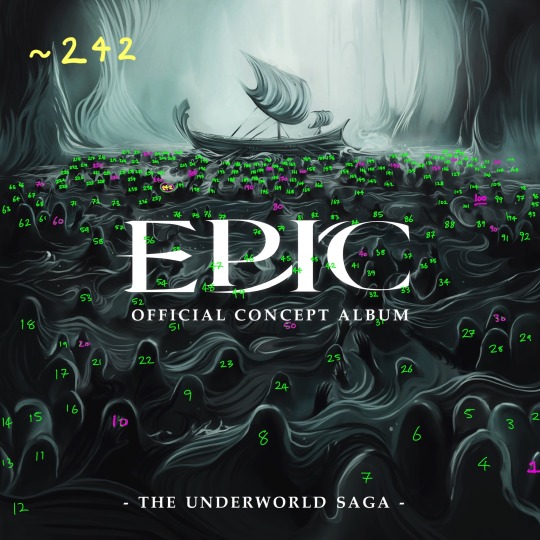
38 notes
·
View notes
Text
my current hyperfixation is the odyssey which is SO funny because for basically thousands of years people have been engaging in fandom about it. like current fic writers and fanartists etc are engaging in this material in the exact same way as people like james joyce, dante, margaret atwood. its cool that this story is a shared thread throughout human history. but it also sucks because to fill that fanfic desire I have to read classic lit instead of just browse ao3
#yes I have listened to epic the musical#the odyssey#odysseus#penelope#meta analysis#my thoughts#shower thoughts#art#ao3#writing#epic the musical
42 notes
·
View notes
Text
(Some) Subtle Musical Connections and Callbacks in Epic: The Musical
I wanted to make a little mini-compliation of these little connections or references I noticed because I haven't seen them anywhere else yet!
"The Horse and the Infant" X "Survive" - the melody on Zeus's line, "I don't think you're ready"/Odysseus's response, "I know that I'm ready" is used in his exhortation to his men, "That is who we're fighting!" The parallel continues throughout the verse, culminating on "right here and now," because he is calling on them to face the looming challenge, which is the only way they have a chance to survive, just as Zeus did to him. He's using an almost divine authority
"The Horse and the Infant" X "Monster" - the opening guitar lead is the same, because we are being introduced to Odysseus (first as he originally is, and then as the changed monster-man he chooses to become)
"Full Speed Ahead" X "Puppeteer" - the melody on "Ithaca's waiting! Penelope's waiting," is used as the opening plucked melody in Puppeteer, because Odysseus knows they had been so close to home. His longing has been painfully renewed and he's thinking of home as Eurylochus comes up to him
"Luck Runs Out" - The ensemble gradually joins in with Eurylochus as he convinces them to doubt Odysseus. Initially they only sing on the word "How?" Which acts as a response to Odysseus's two statements, "We've come this far," and "You doubt that I could figure this out?" But as the song goes on, they begin singing along with Eurylochus on, "You rely on wit / And people die on it," showing their gradual realization and agreement with him
"Keep Your Friends Close" - The melody on Penelope's name is distorted from what it usually is, representing that the vision of Penelope is not real. Additionally, the melody on the word "open" in the four repeated "Just keep your eyes open" lines mirrors the danger motif.
"The Underworld" - As explained in a previous post, when Odysseus's drowned men are crying out to him, Athena's piano is in the background, because not only did he lose her mentorship (a "death" in itself, referenced in "Monster"), he lost his men as a direct consequence of losing Athena. He "severed his own head" and theirs along with it, and her piano plays to represent how those losses are intertwined
This is only a few, but I wanted to highlight some things that I hadn't seen mentioned elsewhere (although they may well have been--I might've just missed them! I'm still pretty new to the fandom)! Feel free to reblog if you find more!! I'll keep adding on/do the same as I find them as well. Ahhh, this musical is amazing!!
#epic the underworld saga#epic the musical#jorge rivera herrans#odysseus#meta#my meta posts#song analysis#kay can i just catch my breath for a second#kay is a classical literature nerd#kay is a musical theater nerd#this musical is exquisite because of exactly these reasons
36 notes
·
View notes
Text
Headcanon for "The Traitors" voice
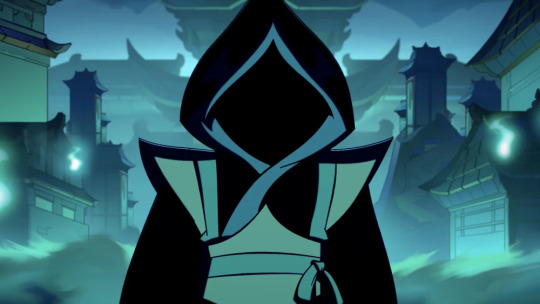
This may be completly wrong, but hey what can i say? I love LMK and i love Epic The Musical
#lego monkie kid#lmk#lmk theory#lmk analysis#lmk season 5#lmk season 4#lmk season four#lmk headcanon#Youtube#Spotify#epic the musical#epic the circe saga
32 notes
·
View notes
Text
So we've seen everything from Just A Man has been fulfilled.
When does a comet become a meteor.
Comets were omens of things to come, almost always bad things. A meteor is piece of rock that falls to earth. So, an actual bad thing. The prophet foretells bad things like a comet used to, and Odysseus becomes the bad thing.
When does a candle become a blaze.
This is a bit more of a stretch, but Aoleus said that she gives the fire enough to stay burning and has her little wind spirits tell the crew that there was treasure in the bag, just as they were about to let their curiosity.
When does a ripple become a tidal wave.
Poseidon. Need I say more?
When does the reason become the blame.
Okay yeah I do. Specifically when he offered an insincere apology that lacked the respect and reverence that a Greek god expected even when they weren't angry.
The reason he keeps going is to see Penelope and Telemachus again. The reason he's changing for the worse is to see Penelope and Telemachus again.
When does a man become a monster.
Umm, also pretty self explanatory.
Edit: I just re-listened to Remember Them and he says, "we're the ones who carry on the flames of those who've gone." They start the musical with just a few flames to carry, but then Poseidon kills most of his men and the candles become a blaze.
#epic the musical#odysseus#epic#epic underworld saga#underworld saga#analysis#musical analysis#just a man#monster#what if I'm the monster#Penelope#epic Penelope#epic Telemachus#a matter class in foreshadowing#dude#posideon#remember them#epic remember them
30 notes
·
View notes
Text
all in all odysseus is a terrible ship captain but a great friend. that's what makes him good protagonist material.
(source: the ocean saga, MONSTER oh my god, Polites' and Anticlea's portions in The Underworld (song))
The key difference between Odysseus and Eurylochus is that Eurylochus is a better ship captain. He understands the wants and needs of the crew and puts them ahead of his own (TO HIS DETRIMENT) and he makes his whole purpose for the crew. If the crew wants trust, go to Eurylochus.
Odysseus is a good skill guy. He can navigate the seas and use clever solutions to get home because he wants to get home as soon as possible. He, however, is not doing it for his crew OR kingdom: he's doing it for his family.
That is why he survives. He can become as ruthless as he needs to be to get to his goals. It's also why he loses support, but he doesn't care. He is willing to use his monster, no matter what it takes.
All these men have their monsters. Eurylochus betrays for his crew, Odysseus kills and saves for the family he has left, Circe turns threats inhuman and Polites lives in defiance of his. Gods don't care about their monsters, not really. Odysseus does care (the point of the entire saga) but he'll become his monster readily when he must. That's what survival is.
#odysseus#oh#epic the musical#monster#the ocean saga#epic the underworld#character analysis#odysseus is relatable- his weak points are the same as all of ours#it isn't shameful#it just is#he knows what he becomes and embraces it
25 notes
·
View notes
Text
Hey what's up I'm making another @anniflamma appreciation post.
While I can't say that "Done For" captivated me as much as "Ruthlessness," I still kept getting dragged back to it. I've watched it at least 20 times now, and there's just something about it.
Immediately, I love how Circe is established instantly as someone not to be fucked with. She senses danger and immediately turns into a giant sea witch. I love the choice of leaving her body detailed but keeping her head and hair as just a black silhouette with bright yellow eyes. It leaves it up to the imagination on how scary she might be behind that silhouette. I also love the touch of her barely visible fins on her face, just to remind you that she's a SEA witch.
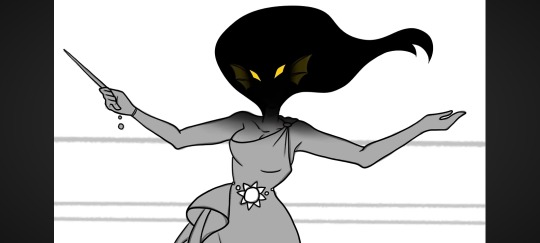
And then the balls on Odysseus to just move her wand to the side with his finger. The cockyness on his face is great. Instantly establishes hubris.
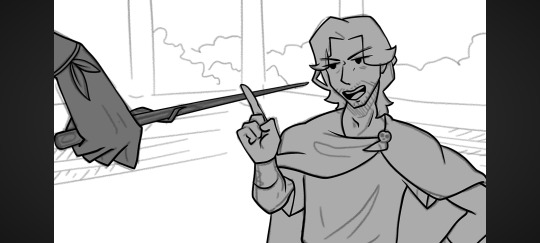
I also ADORE how Circe seems to get smaller as Odysseus explains that she can't hurt him. Its a visual way of showing that her power over him is disappearing. And the facial expression that they managed to pull off with just the yellow eyes showing is fantastic. It's such a perfect mixture of disbelief and fear. Also, I love the choice of Odysseus being light grey contrasted by him being completely surrounded by her all black silhouette. It SHOULD feel like she's the one with the advantage, but her face says differently

And then the contrast between these two shots? Brilliant. Completely flipped the dynamic in one verse of the song.

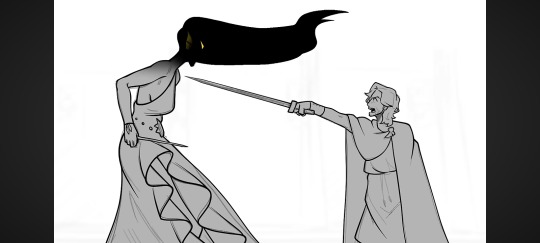
I also love the little detail of Circe checking that her nymphs have left the building before she summons her chimera. It perfectly fits with her motivation of trying to keep them safe, even if it might disadvantage her to hesitate.
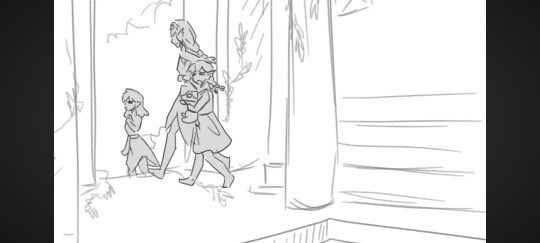

And then the monster fight. The absolute HYPE of that beat drop into monster transition was insane.

Love that the Cyclops just absolutely decks a Chimera no hesitation.
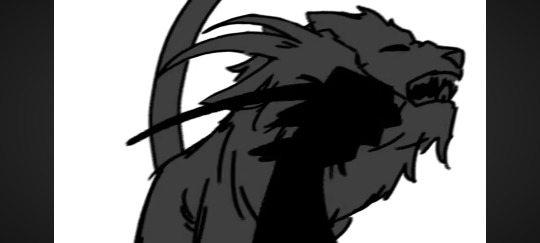
And then the final part? Fucking loved it. I honestly don't know how to read this facial expression from Circe while she explains her love for the nymphs. It's so desperate, but at the same time it kind of reminds me of Azula in a weird way. Like she's a second way from losing it.
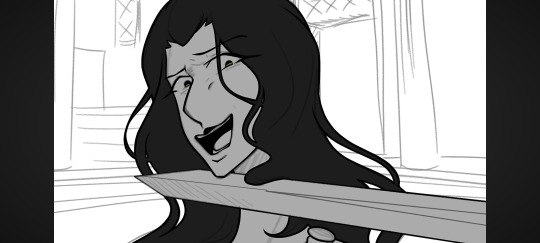
38 notes
·
View notes
Text
the lyricism in Epic the Musical is criminal
-> each song seems to hit like a fucking sucker punch
note: i haven't read the odyssey- my interpretations are purely from the song "-.w-.
"Why are my eyes and my heart and my soul so heavy?"
Just keep your eyes open
"I keep on trying to embrace you both... why won't you let me?"
Keep Your Friends Close
'why won't you let me?' I SWEAR TO GOD
-> his delivery on this specific part legit makes me feel so many emotions it hurts.
Just keep your eyes open
"So much has changed, but I'm the same. Yes, I'm the same!"
Keep Your Friends Close
Odysseus is literally pleading here
-> he's so strung out and burdened by what he's done, that even in a dream what he wants feels out of reach
stars, idk what Jorge Rivera-Herrans laces his songs with but it is GOOD
#epic the musical#epic the ocean saga#epic the circe saga#epic the cyclops saga#epic the troy saga#jorge rivera herrans#musicals#musical theater#theater kid#song analysis#lyricism#i am not ok right now#this man
28 notes
·
View notes
Text
I still can't get over the Circe Saga.
Hermes gives Odysseus a tool to even the playing field. He anticipates and encourages Odysseus to overpower her on a physical, magical, and sexual level. He phrases this help as "us[ing] more than words." He wants Odysseus to give up speech and mercy as much as the other gods do.
But ultimately it's Odysseus's words that save him and his crew. It's him telling Circe about his faith to Penelope that convinces her to help him.
There are other ways of persuasion, indeed.
#leah speaks :3#epic the musical#is this a surface level analysis? yes.#does it make me go feral over odysseus's arc regardless? YES#and of course the fact that immediately after the circe saga we have odysseus's descent into the Underworld and into monsterhood#and he CITES CIRCE AS AN EXAMPLE OF BEING A RUTHLESS MONSTER...#someone he has to EMULATE...#even though CIRCE WAS ULTIMATELY HANDLED WITH MERCY#AND CIRCE HERSELF SAYS 'Maybe showing one act of kindness / Leads to kinder souls down the road'#CONVINCED BY ODYSSEUS#AND NOW IN MONSTER HE'S GIVING THAT UP ENTIRELY#it's TRAGEDY and it KILLS ME and i LOVE IT and I WANT TO STRANGLE ODYSSEUS AND TELL HIM TO KEEP SOME MERCY#anyway im shouting in the tags so much bc this tangent abt the underworld felt kinda disconnected#sorry ive been obsessed with the theme of mercy vs ruthlessness in my own writing too so this musical is thematic catnip to me#leah speaks: tag edition
16 notes
·
View notes
Text
I study English Literature and Classical Civilisation (no joke, I’m studying The Odyssey and have written loads of essays about it), I love musical theatre, I love Greek mythology and I love Epic the musical, so please let me talk about my favourite moment from the Cyclops Saga:
In Survive, Odysseus and his crew sing the words:
“Six hundred lives at stake, it’s just one life to take”
This shows their compassion and sense of brotherhood because every single sailor’s life matters to Odysseus, Polites especially, but they are all his brothers in a way, and they’re almost trying to rationalise killing Polyphemus because it’s just one life - they don’t necessarily want to, but when they kill him, in their own words, their journey’s over. But then Polyphemus enters with his club and kills Polites, and he sings:
“Six hundred lives I’ll take, six hundred lives I’ll break”
He uses violent verbs, and the juxtaposition between the perspectives is a stark contrast to the heroic Greeks who desperately try to rationalise defeating Polyphemus in order to return home, they are not yet at that point where a man would “become a monster”. Polyphemus is selfish, he vows to take all six hundred lives simply because he was hurt and feels disrespected due to the death of his favourite sheep, and in a way he gets his wish because when he is blinded and calls upon his father Poseidon to avenge him, he sets in motion a chain of events which will end with Odysseus alone returning home to Penelope and Telemachus, but only if he obeys the will of the immortals from now on - a lesson for his foolishness.
#lyric analysis#greek mythology#cyclops#polyphemus#odysseus#odyssey#epic the musical#musical theatre#spoilers
24 notes
·
View notes
Text
Jorge in the Underworld watchparty: I've said the world "Saga" more times than I can count tonight! XD
Me:
| "Hello, everyone! And welcome to the EPIC: The Underworld Saga listening party!"
|||| "I'm so excited to share this Saga with you guys! Uh, The Underworld Saga is the fifth Saga of EPIC: The Musical, and it's also the final Saga of Act One."
|| "Remember, EPIC is split into nine different Sagas, and two Acts. Uh, five Acts in the first Saga, and four- no.
| "Four Sagas in the first Act and fi-"
|| "... Five Sagas in Act One, and four Sagas in Act Two. Ok, now my brain is braining!"
||| "Now... Are you guys ready... for The Dark & Edgy Saga! ... That's not the official name, by the way; it's actually The Underworld Saga. But for now, we'll call it The Dark & Edgy Saga."
[First play-through]
||| "And that, ladies and gentlemen, was The Underworld Saga, the fifth Saga of EPIC and also the final Saga of Act One!"
| "The good news is, this is also the shortest Saga in EPIC, which means - I'm gonna play it again!"
[Second play-through]
|||| "That is the fifth Saga of EPIC: The Musical; that is EPIC: The Underworld Saga; is the final Saga of Act One - I've said the world "Saga" more times than I can count tonight!"
| "I hope you guys enjoy this Saga, and... yeah!"
[Last play-through]
| "Alright, my friends! That was EPIC: The Underworld Saga!"
| "Uh- however! EPIC: The Underworld Saga is now out!"
Add it up: 13+4+5+2= [(13+2)+5]+4= (15+5)+4= 20+4= 24
TOTAL: 24
(Oh god, the word "Saga" doesn't even look like a word anymore, why did I do this to myself-)
#i did this instead of sleeping :D#analysis#epic the musical#epic the underworld saga#jorge rivera herrans#maths#funny#maybe? idk whatever i'm tired lmao#the formatting looks really ugly to me rn for some reason#long post#my posts
28 notes
·
View notes